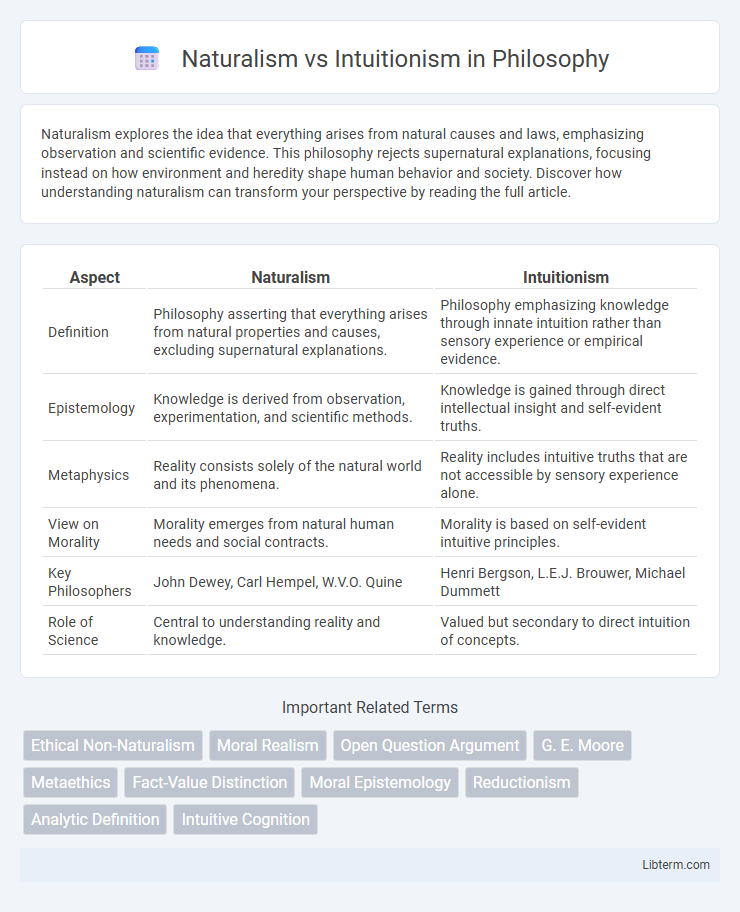Naturalism explores the idea that everything arises from natural causes and laws, emphasizing observation and scientific evidence. This philosophy rejects supernatural explanations, focusing instead on how environment and heredity shape human behavior and society. Discover how understanding naturalism can transform your perspective by reading the full article.
Table of Comparison
| Aspect | Naturalism | Intuitionism |
|---|---|---|
| Definition | Philosophy asserting that everything arises from natural properties and causes, excluding supernatural explanations. | Philosophy emphasizing knowledge through innate intuition rather than sensory experience or empirical evidence. |
| Epistemology | Knowledge is derived from observation, experimentation, and scientific methods. | Knowledge is gained through direct intellectual insight and self-evident truths. |
| Metaphysics | Reality consists solely of the natural world and its phenomena. | Reality includes intuitive truths that are not accessible by sensory experience alone. |
| View on Morality | Morality emerges from natural human needs and social contracts. | Morality is based on self-evident intuitive principles. |
| Key Philosophers | John Dewey, Carl Hempel, W.V.O. Quine | Henri Bergson, L.E.J. Brouwer, Michael Dummett |
| Role of Science | Central to understanding reality and knowledge. | Valued but secondary to direct intuition of concepts. |
Understanding Naturalism in Ethics
Naturalism in ethics asserts that moral properties are reducible to natural properties, such as human well-being or pleasure, grounding ethical statements in empirical facts and science. This approach emphasizes observation and evidence in determining what is morally right, contrasting with Intuitionism's reliance on innate moral knowledge or intuition. Understanding Naturalism involves recognizing its commitment to objective moral truths derived from the natural world, promoting a systematic and verifiable basis for ethical judgments.
Key Principles of Intuitionism
Intuitionism asserts that mathematical truths are known through direct mental insight rather than empirical observation, emphasizing the constructive processes of the human mind. It rejects classical logic's law of excluded middle, prioritizing proofs that provide explicit constructions or algorithms. Key principles include the belief that mathematics is a creation of the human intellect and that mathematical objects exist only when they can be intuitively constructed.
Historical Background: Naturalism vs Intuitionism
Naturalism in ethics emerged prominently in the 19th century, influenced by scientific advancements and the belief that moral properties can be explained through natural facts and empirical observation. Intuitionism arose in response during the early 20th century, emphasizing that moral truths are self-evident and knowable through direct intuition rather than empirical evidence. The historical debate between Naturalism and Intuitionism centers on whether morality is grounded in observable reality or in inherent, non-natural moral insights.
Main Advocates and Philosophers
Naturalism in ethics is prominently advocated by figures like John Dewey and Charles S. Peirce, who emphasize empirical observation and scientific methods to understand moral phenomena. Intuitionism, championed by philosophers such as G.E. Moore and W.D. Ross, asserts that moral truths are self-evident and knowable through direct intuition rather than empirical evidence. Both schools of thought significantly influence contemporary meta-ethics by framing debates around the nature of moral knowledge and the foundation of ethical principles.
Core Differences in Moral Reasoning
Naturalism in moral reasoning asserts that ethical truths are grounded in natural properties and empirical facts, emphasizing observable phenomena and logical analysis. Intuitionism, by contrast, holds that moral truths are known through direct, non-empirical intuition, relying on an innate sense of right and wrong that is not reducible to natural facts. The core difference lies in Naturalism's dependence on external reality and empirical evidence versus Intuitionism's trust in internal, self-evident moral perceptions.
Strengths of Ethical Naturalism
Ethical Naturalism anchors moral properties in observable facts, providing a solid empirical basis for ethical judgments that enhances objectivity and coherence with scientific understanding. It allows for moral disagreements to be resolved through rational inquiry and evidence, promoting consistency in ethical reasoning across diverse contexts. This approach bridges ethics and natural sciences, fostering interdisciplinary dialogue and practical applicability in real-world moral dilemmas.
Strengths of Moral Intuitionism
Moral Intuitionism emphasizes the reliability of human intuition in discerning fundamental ethical truths, providing a direct and accessible way to identify moral principles without relying solely on empirical observation. This approach highlights the inherent capacity of individuals to recognize self-evident moral facts, fostering a more immediate and personal engagement with ethical decision-making. Intuitionism's strength lies in its ability to account for moral knowledge that is not easily reduced to naturalistic terms or scientific verification.
Criticisms and Challenges for Both Approaches
Naturalism faces criticism for its reliance on empirical methods to explain moral truths, often accused of committing the naturalistic fallacy by reducing ethical properties to natural properties. Intuitionism struggles with the subjective nature of moral intuitions, leading to challenges in establishing objective and universally valid moral knowledge. Both approaches grapple with the problem of moral disagreement, where conflicting intuitions or empirical observations complicate the determination of definitive ethical principles.
Contemporary Debates and Applications
Contemporary debates in naturalism vs intuitionism focus on the epistemological foundations of moral knowledge, with naturalists arguing for a science-based approach using empirical data to explain ethical properties, while intuitionists emphasize the non-natural, self-evident principles accessed through moral intuition. Applications in metaethics and normative ethics demonstrate naturalism's influence in moral realism and ethical naturalism, contrasting with intuitionism's role in justifying moral duties without dependence on natural facts. Discussions also address challenges such as the naturalistic fallacy and the critique of intuition's reliability in guiding moral judgments.
Conclusion: Which Approach Better Explains Morality?
Naturalism grounds morality in observable phenomena and scientific facts, providing a tangible basis for ethical theories grounded in human nature and social dynamics. Intuitionism emphasizes moral knowledge through immediate, self-evident insight, highlighting the role of innate moral understanding beyond empirical verification. The debate hinges on whether morality is best explained by objective natural facts or by intuitive moral truths, with naturalism appealing to empirical evidence and intuitionism underscoring intuitive certainty.
Naturalism Infographic

 libterm.com
libterm.com